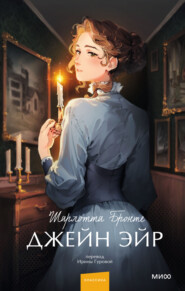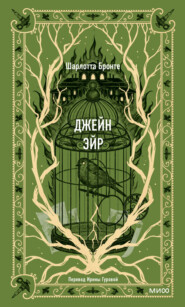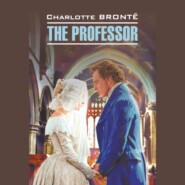По всем вопросам обращайтесь на: info@litportal.ru
(©) 2003-2024.
✖
Jane Eyre
Настройки чтения
Размер шрифта
Высота строк
Поля
“What, already up!” said he, as he entered the nursery. “Well, nurse, how is she?”
Bessie answered that I was doing very well.
“Then she ought to look more cheerful. Come here, Miss Jane: your name is Jane, is it not?”
“Yes, sir, Jane Eyre.”
“Well, you have been crying, Miss Jane Eyre; can you tell me what about? Have you any pain?”
“No, sir.”
“Oh! I daresay she is crying because she could not go out with Missis in the carriage,” interposed Bessie.
“Surely not! why, she is too old for such pettishness.”
I thought so too; and my self-esteem being wounded by the false charge, I answered promptly, “I never cried for such a thing in my life: I hate going out in the carriage. I cry because I am miserable.”
“Oh fie, Miss!” said Bessie.
The good apothecary appeared a little puzzled. I was standing before him; he fixed his eyes on me very steadily: his eyes were small and grey; not very bright, but I dare say I should think them shrewd now: he had a hard-featured yet good-natured looking face. Having considered me at leisure, he said -
“What made you ill yesterday?”
“She had a fall,” said Bessie, again putting in her word.
“Fall! why, that is like a baby again! Can’t she manage to walk at her age? She must be eight or nine years old.”
“I was knocked down,” was the blunt explanation, jerked out of me by another pang of mortified pride; “but that did not make me ill,” I added; while Mr. Lloyd helped himself to a pinch of snuff.
As he was returning the box to his waistcoat pocket, a loud bell rang for the servants’ dinner; he knew what it was. “That’s for you, nurse,” said he; “you can go down; I’ll give Miss Jane a lecture till you come back.”
Bessie would rather have stayed, but she was obliged to go, because punctuality at meals was rigidly enforced at Gateshead Hall.
“The fall did not make you ill; what did, then?” pursued Mr. Lloyd when Bessie was gone.
“I was shut up in a room where there is a ghost till after dark.”
I saw Mr. Lloyd smile and frown at the same time.
“Ghost! What, you are a baby after all! You are afraid of ghosts?”
“Of Mr. Reed’s ghost I am: he died in that room, and was laid out there. Neither Bessie nor any one else will go into it at night, if they can help it; and it was cruel to shut me up alone without a candle, – so cruel that I think I shall never forget it.”
“Nonsense! And is it that makes you so miserable? Are you afraid now in daylight?”
“No: but night will come again before long: and besides, – I am unhappy, – very unhappy, for other things.”
“What other things? Can you tell me some of them?”
How much I wished to reply fully to this question! How difficult it was to frame any answer! Children can feel, but they cannot analyse their feelings; and if the analysis is partially effected in thought, they know not how to express the result of the process in words. Fearful, however, of losing this first and only opportunity of relieving my grief by imparting it, I, after a disturbed pause, contrived to frame a meagre, though, as far as it went, true response.
“For one thing, I have no father or mother, brothers or sisters.”
“You have a kind aunt and cousins.”
Again I paused; then bunglingly enounced -
“But John Reed knocked me down, and my aunt shut me up in the red-room.”
Mr. Lloyd a second time produced his snuff-box.
“Don’t you think Gateshead Hall a very beautiful house?” asked he. “Are you not very thankful to have such a fine place to live at?”
“It is not my house, sir; and Abbot says I have less right to be here than a servant.”
“Pooh! you can’t be silly enough to wish to leave such a splendid place?”
“If I had anywhere else to go, I should be glad to leave it; but I can never get away from Gateshead till I am a woman.”
“Perhaps you may – who knows? Have you any relations besides Mrs. Reed?”
“I think not, sir.”
“None belonging to your father?”
“I don’t know. I asked Aunt Reed once, and she said possibly I might have some poor, low relations called Eyre, but she knew nothing about them.”
“If you had such, would you like to go to them?”
I reflected. Poverty looks grim to grown people; still more so to children: they have not much idea of industrious, working, respectable poverty; they think of the word only as connected with ragged clothes, scanty food, fireless grates, rude manners, and debasing vices: poverty for me was synonymous with degradation.
“No; I should not like to belong to poor people,” was my reply.
“Not even if they were kind to you?”
I shook my head: I could not see how poor people had the means of being kind; and then to learn to speak like them, to adopt their manners, to be uneducated, to grow up like one of the poor women I saw sometimes nursing their children or washing their clothes at the cottage doors of the village of Gateshead: no, I was not heroic enough to purchase liberty at the price of caste.
“But are your relatives so very poor? Are they working people?”
“I cannot tell; Aunt Reed says if I have any, they must be a beggarly set: I should not like to go a begging.”
“Would you like to go to school?”
Again I reflected: I scarcely knew what school was: Bessie sometimes spoke of it as a place where young ladies sat in the stocks, wore backboards, and were expected to be exceedingly genteel and precise: John Reed hated his school, and abused his master; but John Reed’s tastes were no rule for mine, and if Bessie’s accounts of school-discipline (gathered from the young ladies of a family where she had lived before coming to Gateshead) were somewhat appalling, her details of certain accomplishments attained by these same young ladies were, I thought, equally attractive. She boasted of beautiful paintings of landscapes and flowers by them executed; of songs they could sing and pieces they could play, of purses they could net, of French books they could translate; till my spirit was moved to emulation as I listened. Besides, school would be a complete change: it implied a long journey, an entire separation from Gateshead, an entrance into a new life.
“I should indeed like to go to school,” was the audible conclusion of my musings.
“Well, well! who knows what may happen?” said Mr. Lloyd, as he got up. “The child ought to have change of air and scene,” he added, speaking to himself; “nerves not in a good state.”

















